Best Crypto Wallet Apps 2024: Top 10 Free & Secure
Best crypto wallet apps 2024: Find top 10 hot & cold wallets, hardware, software, and multi-currency options for securely storing cryptocurrency.
Best crypto wallet apps offer a safe and reliable way to store, manage, and trade your digital assets in 2024. With the growing popularity of cryptocurrencies, choosing the right wallet has never been more important. From beginners seeking simplicity to experienced traders needing advanced security, selecting a wallet tailored to your needs is crucial.
This guide will highlight the top 10 free & secure digital asset wallet apps, featuring the best hot and cold wallets, hardware, software, and multi-currency options. We’ll explore popular names like MetaMask, Trust Wallet, and Coinbase Wallet, as well as industry-leading hardware wallets like Ledger and Trezor. Each wallet comes with its unique strengths, whether it’s ease of use, high-level security, or multi-chain support.
Ready to find the best wallet to securely store your cryptocurrency in 2024? Let’s dive in and review the top choices that will keep your digital assets safe and accessible!
What is a Crypto Wallet?
A digital asset wallet is a digital tool that securely stores the keys needed to access, manage, and transfer your cryptocurrency holdings. It doesn’t physically hold coins but uses public and private keys to interact with blockchain networks. The public key serves as your wallet’s address, allowing others to send funds, while the private key is like a password, giving you full control and access to your assets.
Whether you want to send, receive, or simply view your crypto balance, a wallet is essential for managing digital assets. Security is a core component of any good crypto storage app—protecting your private keys is crucial because losing them can mean losing access to your funds permanently. Some popular wallets like MetaMask or Coinbase Wallet are known for their ease of use, while others like Ledger are renowned for their advanced security features.
Having a reliable crypto storage app is key to navigating the cryptocurrency world, whether you’re a beginner or an experienced investor.
Types of Digital Asset Wallet Apps: Hot Wallets vs. Cold Wallets
crypto storage apps can be broadly categorized into Hot Wallets and Cold Wallets, each serving distinct purposes based on their connectivity and security. Understanding these types is crucial when choosing the right wallet for your needs.
Hot Wallets: Connected for Convenience
Hot wallets are digital wallets that are connected to the internet, making them easily accessible for transactions and trading. They come in various forms such as mobile apps, desktop software, and browser extensions. Examples include MetaMask, Trust Wallet, and Crypto.com DeFi Wallet. These wallets are popular among active traders due to their convenience and fast transaction speeds. However, the always-online nature of hot wallets can expose them to cyber threats, such as hacking or phishing attacks.
User Experience Note: A real-world case involves Exodus Wallet, a well-known hot wallet that allows users to trade and monitor their portfolio within the app. It integrates seamlessly with hardware wallets like Trezor, giving users the flexibility of hot wallet convenience with the added security of cold storage.
Cold Wallets: Maximum Security, Minimal Accessibility
Cold wallets, on the other hand, store private keys offline, providing enhanced security. Typically in the form of hardware devices like Ledger or Trezor, cold wallets are ideal for long-term holders who prioritize safety over frequent transactions. These wallets are disconnected from the internet, making them nearly immune to online hacking attempts. However, this heightened security comes at the cost of accessibility, as transactions usually require connecting the device to a computer.
Real-World Case Study: In 2020, Ledger, a leading cold wallet provider, experienced a data breach that leaked customer contact information. However, since the devices store private keys offline, no user funds were compromised, highlighting the resilience of cold wallets against online threats.
Which Should You Choose?
If you’re an active trader or frequently use DeFi applications, a hot wallet offers the speed and convenience you need. However, if security is your top priority, especially for storing larger amounts of crypto, opting for a cold wallet is the safest choice. Many users choose to use both—a hot wallet for daily use and a cold wallet for long-term storage.
Top 10 Best Crypto Wallet Apps for 2024: Quick Overview
Here’s a brief look at the top 10 crypto storage apps for 2024, highlighting the strengths and unique features that make them stand out for secure and efficient digital asset management:
| Wallet Name | Type | Best For | Key Features |
|---|---|---|---|
| MetaMask | Hot Wallet | Ethereum and dApp Integration | Supports ETH & ERC-20 tokens, Web3 compatibility, dApp access |
| Trust Wallet | Hot Wallet | Multi-Asset Support and Binance Users | Supports 70+ blockchains, built-in staking, Web3 browser |
| Coinbase Wallet | Hot Wallet | Beginners and Exchange Integration | Hundreds of assets, DEX integration, cold storage compatibility |
| Crypto.com DeFi Wallet | Hot Wallet | DeFi Staking and Multi-Platform Integration | Staking options, Ethereum gas tracker, integrated with Crypto.com |
| Exodus Wallet | Hot Wallet | Portfolio Tracking and Multi-Asset Management | 360+ assets, portfolio tracker, 24/7 customer support |
| ZenGo | Hot Wallet | Easy Account Recovery and Beginner Friendly | MPC technology, facial recognition, staking options |
| Ledger Nano X | Cold Wallet | Security and Multi-Currency Storage | Supports 5,000+ assets, Bluetooth, Ledger Live app integration |
| Trezor Model T | Cold Wallet | Advanced Security and Transparency | Touchscreen, Shamir backup, open-source code |
| KeepKey | Cold Wallet | Affordability and Major Crypto Support | Supports 40+ cryptocurrencies, large display, Shapeshift integration |
| Guarda Wallet | Multi-Currency | Asset Variety and Staking | 50+ blockchains, staking, non-custodial, cross-platform access |
- MetaMask
Best for interacting with decentralized applications (dApps) and the Ethereum ecosystem. It offers Web3 integration and supports ERC-20 tokens, making it ideal for DeFi users and NFT enthusiasts. - Trust Wallet
A versatile wallet supporting over 9 million assets, including Bitcoin, Ethereum, and NFTs. Trust Wallet is known for its simple interface and strong security, though it’s backed by Binance and may not appeal to absolute beginners. - Coinbase Wallet
Perfect for beginners looking for an intuitive, secure wallet. It’s a self-custody hot wallet that doesn’t require a Coinbase account to use. Integration with Ledger also offers a cold storage option. - Ledger Nano X
A leading cold wallet known for its high security and multi-currency support. It’s a great choice for long-term holders who want offline protection and access to more than 1,800 digital assets. - Trezor Model T
A hardware wallet with an emphasis on advanced security and a touchscreen interface. Compatible with multiple blockchains, it’s favored by those looking for top-notch security. - Exodus
A visually appealing hot wallet that supports over 260 cryptocurrencies. It’s known for its built-in exchange, portfolio tracking, and 24/7 customer support. Integrates with Trezor for cold storage security. - Crypto.com DeFi Wallet
Best for users seeking a DeFi-focused experience. It supports staking and access to decentralized finance platforms, making it a strong choice for earning passive income on crypto. - KeepKey
A budget-friendly cold wallet option, KeepKey is known for its sleek design and easy usability. It supports major cryptocurrencies like Bitcoin and Ethereum, making it a solid entry-level choice for securing essential assets. With its large display for clear transaction confirmations and seamless Shapeshift integration, KeepKey is ideal for users looking to store their crypto offline without breaking the bank. - ZenGo
Known for its unique security model using Multi-Party Computation (MPC) technology, eliminating the need for traditional seed phrases. ZenGo is user-friendly and has strong customer support, making it great for both beginners and advanced users. - Guarda Wallet
Guarda Wallet is a versatile multi-currency wallet, supporting over 50 blockchains and thousands of tokens. It’s accessible across desktop, mobile, and browser extensions, making it convenient for users managing diverse portfolios. With built-in staking and a user-friendly interface, Guarda Wallet is perfect for investors seeking a secure, all-in-one solution to store and manage various digital assets.
Each wallet offers a distinct blend of features and benefits tailored to different user needs, whether you prioritize security, ease of use, or multi-asset support. Choose the one that aligns with your specific requirements for 2024!
Best Hot Wallets in 2024 for Secure & Convenient Storage
Hot wallets are known for their easy accessibility, making them ideal for active traders and those frequently engaging with DeFi platforms or NFTs. In 2024, the best hot wallets offer a blend of security, functionality, and support for multiple digital assets, ensuring a smooth user experience.
1. Crypto.com DeFi Wallet – Best for DeFi Staking
Overview
The Crypto.com DeFi Wallet is designed for users who want a seamless connection between the Crypto.com exchange and decentralized finance platforms. It provides features like staking, easy asset transfers, and integration with DeFi applications, making it perfect for those looking to earn passive income.
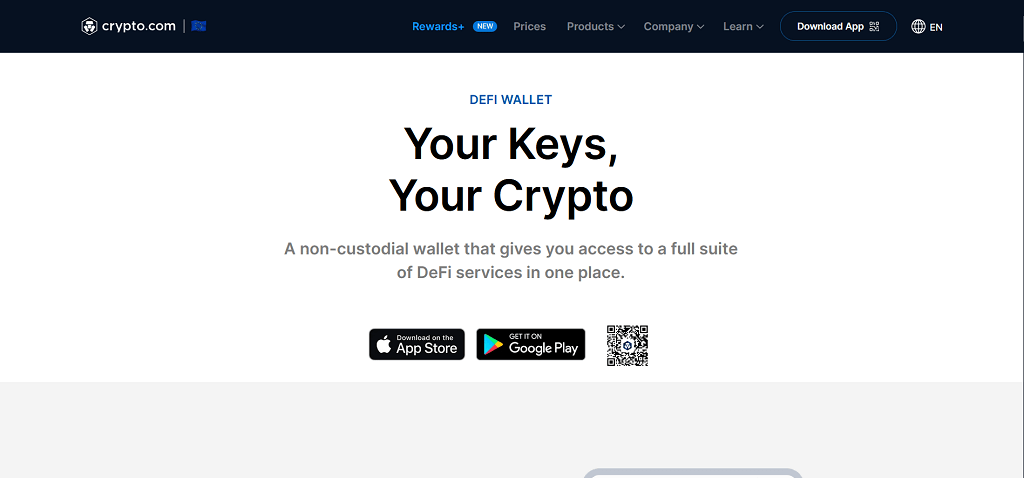
Key Features:
- Supports 30+ blockchains, including Ethereum, Bitcoin, and the native Crypto.com chain.
- One-click staking options for multiple cryptocurrencies.
- Ethereum gas tracker to optimize transaction fees.
- Integration with the Crypto.com app and exchange.
Strengths:
- Staking Rewards: Offers competitive staking options for various coins.
- Easy Exchange Transfers: Seamless connection between wallet and Crypto.com exchange.
- DeFi Compatibility: Supports direct access to DeFi platforms.
Limitations:
- Centralized Association: Some users may not prefer a wallet linked to a centralized exchange.
- Staking Fees: A 0.05% fee on staking rewards might be a drawback for high-volume users.
Ideal For:
Crypto investors looking to engage in DeFi staking or those using the Crypto.com exchange regularly.
Final Takeaway:
The Crypto.com DeFi Wallet is a powerful tool for DeFi enthusiasts who want to stake assets easily and track gas fees, but its centralized connection might not appeal to privacy-focused users.
2. MetaMask – Best for Ethereum and dApp Integration
Overview
MetaMask is one of the most popular wallets for interacting with the Ethereum ecosystem and other EVM-compatible networks like Polygon. With its ease of use and seamless connection to dApps, it’s perfect for DeFi and NFT traders looking to explore Web3 applications.
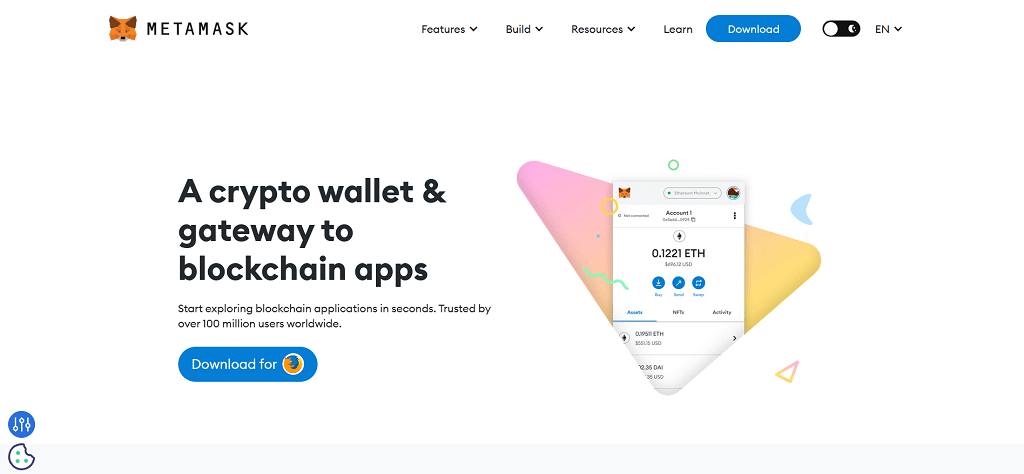
Key Features:
- Supports Ethereum and all ERC-20 tokens.
- Browser extension and mobile app available.
- Direct connection to DeFi apps and NFT marketplaces.
- Customizable gas fees for optimized transactions.
Strengths:
- Web3 Access: Effortless integration with DeFi and NFT platforms.
- Ledger Compatibility: Can pair with Ledger hardware wallets for extra security.
- Open-Source: Transparency in code, allowing for community contributions.
Limitations:
- No Native Bitcoin Support: Limited to Ethereum-compatible assets only.
- Security Vulnerabilities: Being a hot wallet, it’s more exposed to phishing and online hacks.
Ideal For:
Users involved in Ethereum-based DeFi applications, NFT traders, and those who need quick access to dApps.
Final Takeaway:
MetaMask’s powerful features and ease of use make it a top choice for Ethereum enthusiasts, but its lack of Bitcoin support and hot wallet security risks may require pairing with a hardware wallet for higher-value holdings.
3. Trust Wallet – Best for Multi-Asset Support and Binance Users
Overview
Trust Wallet is a versatile, user-friendly wallet supporting over 9 million assets, including NFTs, making it an excellent choice for users who want to manage a diverse portfolio. Owned by Binance, it offers seamless integration with the Binance exchange and access to DeFi dApps.
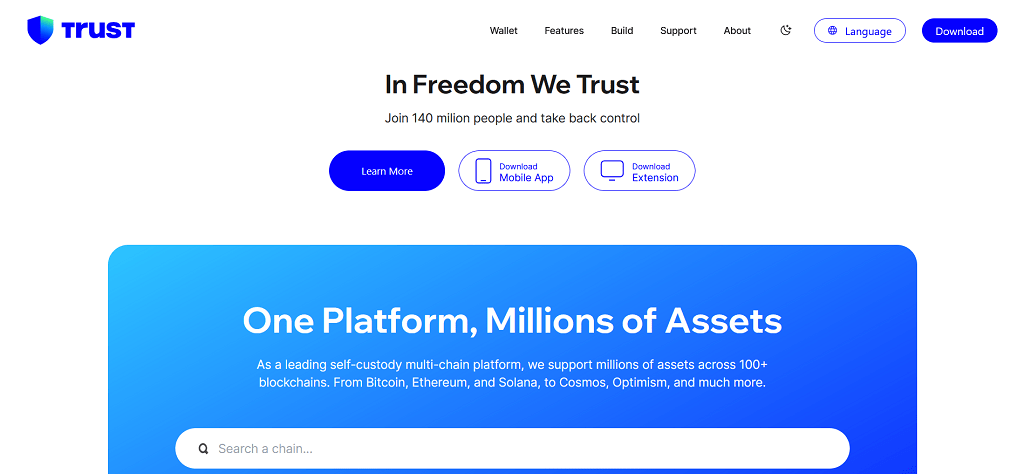
Key Features:
- Supports over 70 blockchains, including Bitcoin, Ethereum, and Solana.
- Integrated Web3 browser for dApp access.
- Built-in staking for several assets.
- Multi-layer security, including seed phrases and PIN codes.
Strengths:
- Broad Asset Support: One of the widest ranges of supported blockchains and tokens.
- Binance Integration: Easy transfer of assets to and from Binance exchange.
- NFT Compatibility: Store and trade NFTs directly in the wallet.
Limitations:
- Limited Security Features: Lacks advanced security options like two-factor authentication.
- Centralized Connection: Association with Binance may deter users who prefer decentralized options.
Ideal For:
Users with diverse portfolios, Binance traders, and those seeking a single wallet for both crypto and NFT management.
Final Takeaway:
Trust Wallet’s multi-asset support and Binance integration make it a go-to choice for users looking for versatility and ease of use, though its limited security options may not satisfy highly security-conscious users.
Best Cold Wallets in 2024 for Maximum Security
Cold wallets, also known as hardware wallets, are the go-to choice for users who prioritize security over convenience. By keeping your private keys offline, these wallets are nearly immune to online threats like hacking or phishing, making them ideal for long-term storage of high-value assets. In 2024, the top contenders for cold wallets offer robust security features, user-friendly interfaces, and support for a wide range of cryptocurrencies. Let’s explore the best cold wallets for maximum security this year.
1. Ledger Nano X – Best Overall for Security and Versatility
Overview
The Ledger Nano X is one of the most popular and trusted hardware wallets on the market, known for its multi-currency support and advanced security features. With Bluetooth functionality, it allows users to manage over 5,000 cryptocurrencies directly from their smartphone or desktop.
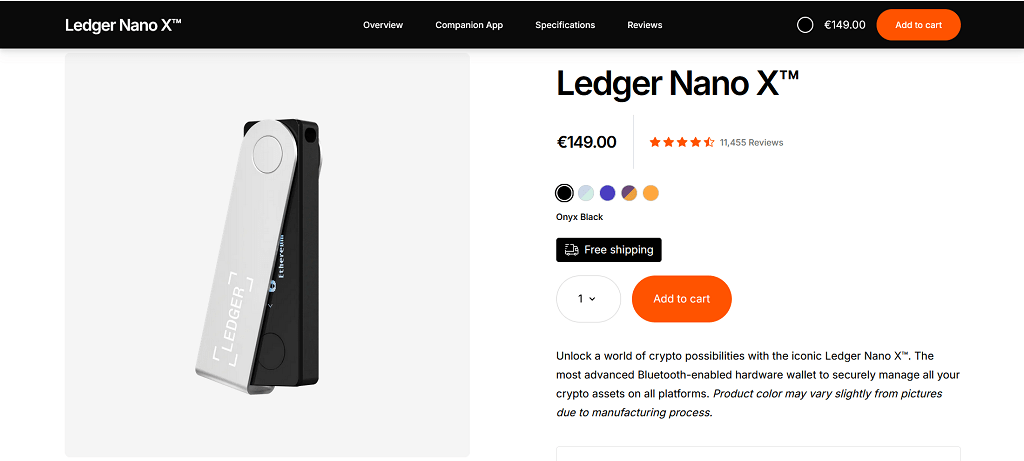
Key Features:
- Supports 5,000+ cryptocurrencies, including Bitcoin, Ethereum, and ERC-20 tokens.
- Bluetooth connectivity for easy use on mobile devices.
- Integration with software wallets like MetaMask and Mycelium.
- Secure Element chip and custom OS for high-level protection.
Strengths:
- Multi-Currency Support: Extensive range of supported assets, making it perfect for users with diverse portfolios.
- Bluetooth Functionality: Convenient for managing funds on the go without compromising security.
- Ledger Live Integration: Manage, stake, and trade directly from the Ledger Live app.
Limitations:
- Higher Price Point: More expensive compared to other hardware wallets, with a base cost of $149.
- Previous Data Breach: While no funds were compromised, a past breach exposed some user contact details, affecting user trust.
Ideal For:
Crypto holders looking for a high-security solution with flexibility and multi-device support.
Final Takeaway:
The Ledger Nano X is a top choice for anyone seeking maximum security and asset flexibility. Its advanced features and robust design make it a powerful tool for both beginners and experienced users.
2. Trezor Model T – Best for Advanced Security Features
Overview
The Trezor Model T is known for its intuitive touchscreen interface and open-source security. As a pioneer in the hardware wallet space, Trezor provides state-of-the-art protection for more than 1,800 assets, including support for advanced cryptographic features and password management.
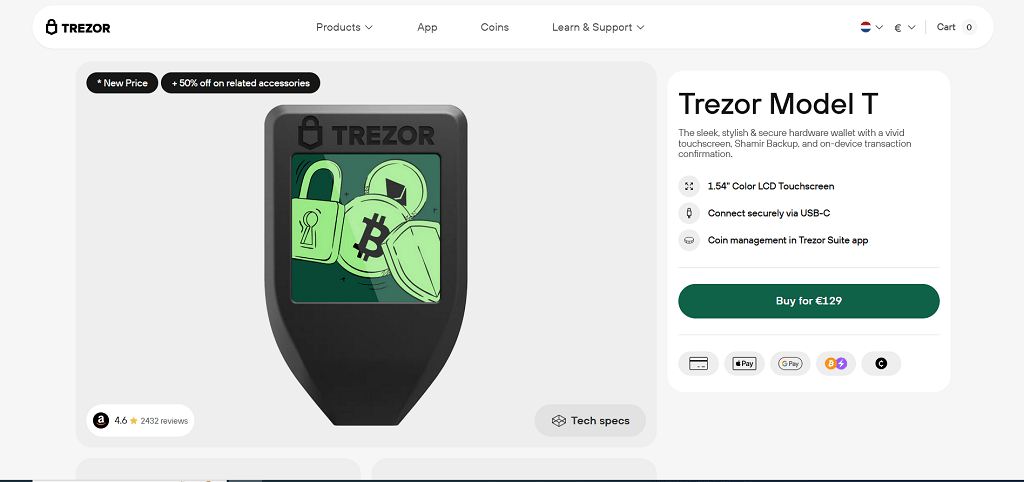
Key Features:
- Touchscreen interface for easy navigation and transaction verification.
- Support for 1,800+ cryptocurrencies, including Bitcoin, Ethereum, and Litecoin.
- Built-in password manager and secure key storage.
- Shamir Backup for advanced recovery options.
Strengths:
- User-Friendly Touchscreen: Simplifies the transaction process, making it easier to verify addresses and sign transactions securely.
- Open-Source Code: Allows the community to verify and contribute to the wallet’s security.
- Shamir Backup: A unique feature that allows you to split your recovery seed into multiple parts for enhanced protection.
Limitations:
- Plastic Build: The physical body feels less premium compared to the Ledger Nano X’s metal casing.
- Limited Third-Party Integration: Fewer integrations with software wallets and platforms than Ledger.
Ideal For:
Users looking for top-tier security features and a transparent, open-source solution for managing large crypto holdings.
Final Takeaway:
With its focus on transparency and high-end security, the Trezor Model T is a great choice for those who want absolute control and advanced backup options for their digital assets.
3. KeepKey – Best for Affordability
Overview
KeepKey is a more budget-friendly hardware wallet option, making it accessible for newcomers or those looking to secure smaller holdings. While it supports over 40 cryptocurrencies, it is best suited for users focused on holding major assets like Bitcoin and Ethereum.
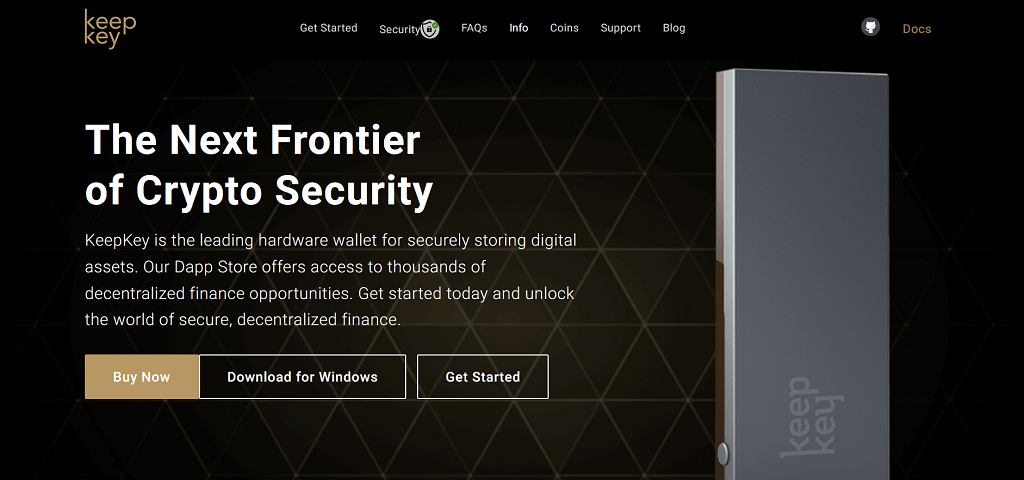
Key Features:
- Support for over 40 cryptocurrencies, including Bitcoin, Ethereum, and Litecoin.
- Large display screen for clear transaction confirmation.
- Shapeshift integration for easy asset swapping.
- Affordable pricing, typically starting at $49.
Strengths:
- Affordable Security: A great entry-level hardware wallet for users on a budget.
- User-Friendly Design: The large display makes it easy to verify transactions.
- Shapeshift Integration: Allows for quick swaps between supported assets without needing to move funds.
Limitations:
- Limited Asset Support: Fewer supported cryptocurrencies compared to Ledger and Trezor.
- Slower Updates: Lacks some of the latest features and integrations found in its competitors.
Ideal For:
Beginners or budget-conscious users who want reliable hardware security for storing primary digital assets.
Final Takeaway:
KeepKey is a solid choice for those who want basic hardware security at an affordable price. While it may not offer the same range of features as Ledger or Trezor, it covers essential security needs effectively.
Top Multi-Currency Wallets for Managing Diverse Crypto Assets
Multi-currency wallets are essential for investors holding a variety of digital assets across multiple blockchains. These wallets provide a unified solution for storing, managing, and transferring various cryptocurrencies, making them highly versatile and convenient. In 2024, some of the top multi-currency wallets stand out for their robust features, high security, and user-friendly interfaces. Here’s a quick overview of the best options for managing diverse crypto portfolios.
1. Guarda Wallet – Best for Asset Variety
Overview
Guarda Wallet is a versatile multi-currency wallet supporting over 50 blockchains and thousands of tokens. Available on desktop, mobile, and browser extensions, it’s known for its broad asset support and built-in exchange, allowing users to store, send, receive, and swap different cryptocurrencies in one place.
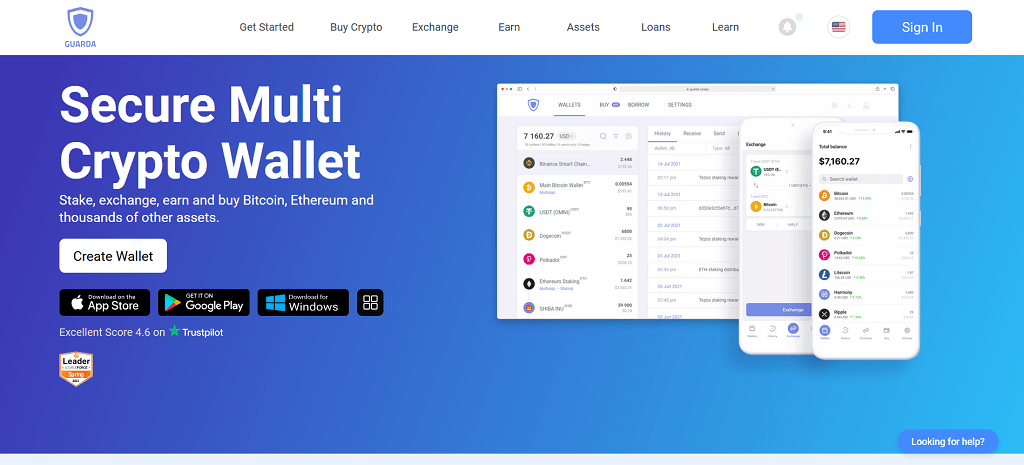
Key Features:
- Supports over 50 blockchains and 400,000+ tokens, including Bitcoin, Ethereum, Cardano, and Solana.
- Built-in staking options for popular cryptocurrencies like Tezos and Ethereum.
- Accessible via desktop, mobile, and web browsers.
- Non-custodial, giving users complete control over their private keys.
Strengths:
- Wide Asset Support: Perfect for users managing diverse portfolios.
- Staking Capabilities: Provides opportunities to earn passive income.
- User-Friendly Interface: Suitable for both beginners and experienced traders.
Limitations:
- High Exchange Fees: The built-in exchange charges a relatively high fee of 3.5%.
- No NFT Support: Currently lacks compatibility for storing and trading NFTs.
Ideal For:
Crypto enthusiasts looking for a single wallet solution to manage various assets and participate in staking.
Final Takeaway:
With its extensive multi-currency support and flexible platform options, Guarda Wallet is an excellent choice for users seeking a comprehensive tool to handle a wide range of cryptocurrencies.
2. Exodus Wallet – Best for Portfolio Tracking
Overview
Exodus Wallet is a popular choice for managing diverse assets, offering a seamless experience across desktop and mobile platforms. It supports over 360 cryptocurrencies and features a built-in exchange, making it easy to swap assets on the go. Its standout feature is the integrated portfolio tracker, providing users with real-time updates on the value of their holdings.
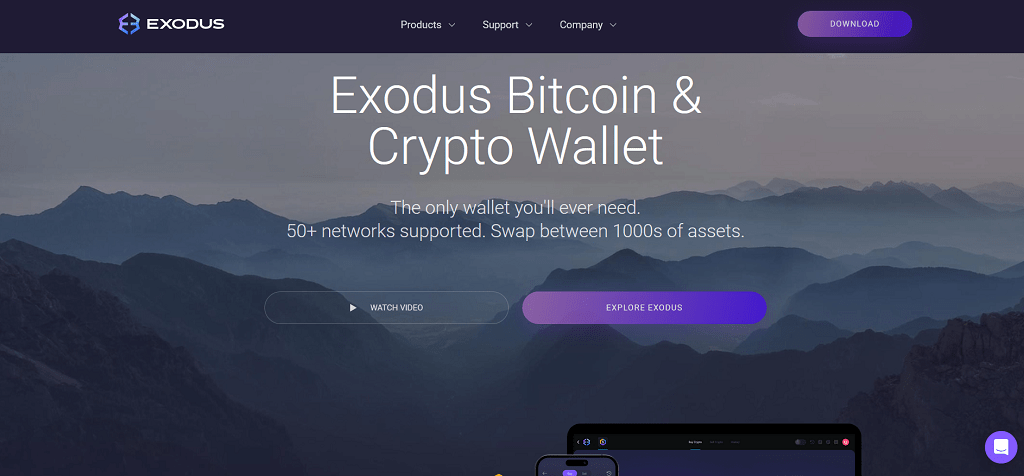
Key Features:
- Supports 360+ cryptocurrencies, including Bitcoin, Ethereum, and Solana.
- Integrated exchange for quick asset swaps.
- 24/7 customer support via chat and email.
- Compatibility with Trezor hardware wallets for added security.
Strengths:
- Portfolio Tracking: Real-time updates on portfolio performance.
- Customer Support: One of the few wallets offering round-the-clock support.
- User-Friendly Design: Simplified interface, perfect for users new to crypto.
Limitations:
- Closed Source: The software is not open-source, limiting transparency.
- No Two-Factor Authentication: Lacks advanced security features like 2FA.
Ideal For:
Traders and investors who want to monitor their portfolio performance and make quick swaps without leaving the wallet.
Final Takeaway:
Exodus Wallet’s strong support for a wide range of assets and easy-to-use interface make it a solid choice for anyone looking to track and manage their crypto investments efficiently.
Best Free Digital Asset Wallet Apps for Beginners
Choosing the right wallet is crucial for beginners in the cryptocurrency space. The ideal wallet should be easy to set up, intuitive to use, and offer strong security features. In 2024, two standout free wallet options—Coinbase Wallet and ZenGo—cater perfectly to beginners looking for secure and accessible crypto storage. Let’s dive into what makes them excellent choices for newcomers.
1. Coinbase Wallet – User-Friendly and Exchange Integration
Overview
Coinbase Wallet is a beginner-friendly, self-custody wallet that offers seamless integration with the popular Coinbase exchange. It allows users to store a wide range of digital assets, including Bitcoin, Ethereum, and other ERC-20 tokens, without needing a separate Coinbase account. With its intuitive interface and strong security features, it’s a great starting point for those new to managing their own crypto assets.
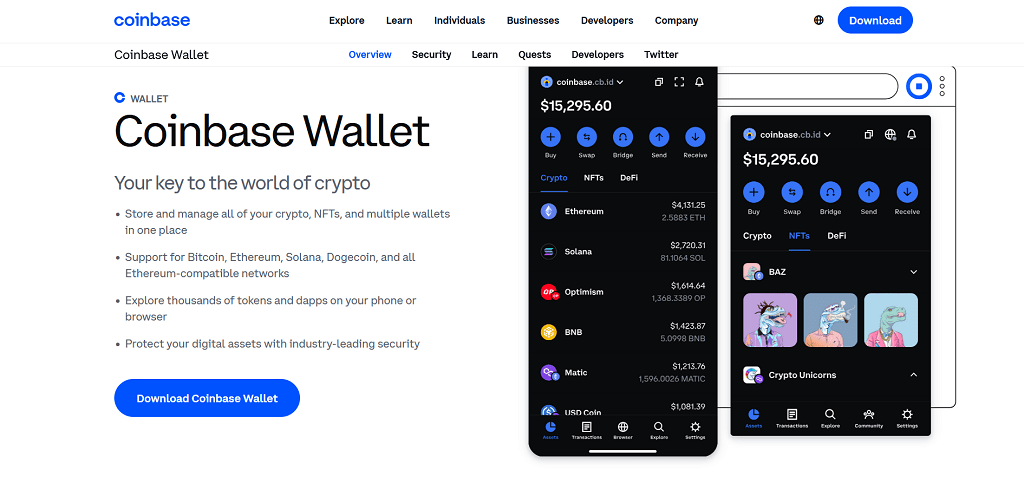
Key Features:
- Supports hundreds of thousands of crypto assets.
- Seamless interaction with decentralized exchanges (DEXs) like Uniswap and 1inch.
- Option to integrate with Ledger hardware wallets for enhanced security.
- Backed by Coinbase, a trusted name in the industry.
User Experience Example:
Many new users appreciate the ease of connecting to DEXs and decentralized applications (dApps) directly from the wallet, making it simple to explore DeFi without leaving the app. Additionally, its Ledger integration is often used by beginners who want to gradually transition into more secure cold storage.
Final Takeaway:
Coinbase Wallet is perfect for beginners who want a reliable wallet with easy access to both trading and DeFi applications, backed by the security of a reputable brand.
2. ZenGo – Unique Security Model and Easy Account Recovery
Overview
ZenGo stands out for its innovative security model that eliminates the need for a traditional seed phrase. Instead, it uses Multi-Party Computation (MPC) technology, splitting the private key into two parts—one stored on the user’s device and the other on ZenGo’s servers—allowing for easy recovery if access is lost. This unique setup makes it highly appealing to beginners who might be worried about losing their keys.
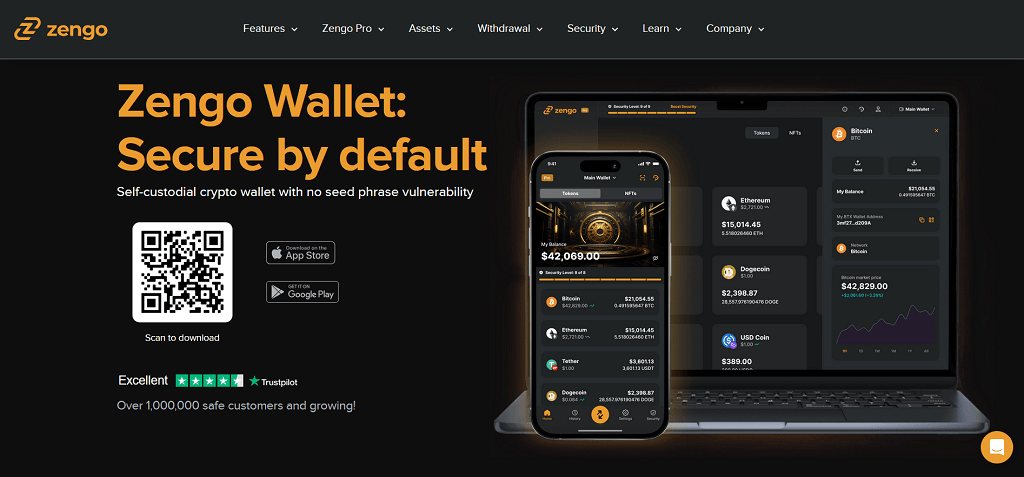
Key Features:
- No traditional seed phrase needed—uses a recovery model based on facial recognition and MPC.
- Supports major cryptocurrencies like Bitcoin, Ethereum, and Dogecoin.
- Built-in options for earning interest through staking and lending.
- 24/7 live customer support for quick assistance.
User Experience Example:
A common use case involves beginners who often fear losing their seed phrases. ZenGo’s approach offers peace of mind with its facial recognition recovery process, making it an excellent starting point for those who find traditional wallet setups too complicated.
Final Takeaway:
ZenGo’s unique security model and user-friendly setup make it an ideal wallet for beginners who prioritize ease of access and recovery over managing complex private keys.
Both Coinbase Wallet and ZenGo provide strong foundations for new users entering the crypto world, offering intuitive interfaces and innovative security features that reduce the complexity of managing digital assets.
How to Choose the Right Digital Asset Wallet App: Key Factors to Consider
Selecting the right digital asset wallet depends on several critical factors, such as security, ease of use, and compatibility. Whether you’re a beginner or an experienced trader, these key considerations will help you find a wallet that best suits your needs.
1. Security Features
Security should always be the top priority when choosing a wallet. Look for features such as two-factor authentication (2FA), biometric verification, and encryption to protect your private keys. If you’re opting for a hot wallet, consider one that integrates with a hardware wallet like Ledger for an additional layer of security. A real-world example is the Ledger Nano X, which uses a Secure Element chip to safeguard private keys from online threats.
2. Type of Wallet: Hot vs. Cold
Understanding the difference between hot and cold wallets is crucial. Hot wallets are internet-connected and convenient for frequent transactions, but they are more susceptible to hacking. Cold wallets, like hardware wallets, store your private keys offline, making them ideal for long-term storage and higher security.
Use Case Example: If you trade daily, a hot wallet like Trust Wallet might be suitable, while long-term holders can benefit from using a cold wallet like Trezor Model T for maximum protection.
3. Supported Cryptocurrencies
Make sure the wallet you choose supports the specific cryptocurrencies you hold. Some wallets, like Exodus and Guarda Wallet, support hundreds of assets, making them perfect for managing diverse portfolios. On the other hand, options like Electrum cater specifically to Bitcoin users.
4. Backup and Recovery Options
Losing access to your private keys can result in permanent loss of assets. Choose a wallet that offers reliable backup and recovery options, such as a seed phrase or Multi-Party Computation (MPC) technology. ZenGo, for example, uses facial recognition for recovery, eliminating the risk of losing a traditional seed phrase.
5. User Interface and Ease of Use
A user-friendly interface is essential, especially for beginners. Wallets like Coinbase Wallet and ZenGo are designed with simplicity in mind, making them easy to navigate. Look for wallets that provide clear transaction details, straightforward setup, and responsive customer support.
6. Additional Features: Staking and DeFi Access
Some wallets go beyond basic storage and offer staking options, DeFi access, or built-in exchanges. For example, Crypto.com DeFi Wallet allows users to stake multiple assets and interact with DeFi protocols, making it an excellent choice for users looking to earn passive income.
7. Compatibility Across Platforms
Choose a wallet that is compatible with multiple platforms—mobile, desktop, and browser extensions—if you need flexibility. MetaMask and Guarda Wallet excel in this area, allowing users to access their assets seamlessly across different devices.
When choosing a crypto storage, consider your security needs, the types of assets you hold, and your intended use. Evaluate each option based on its features and real-world use cases to ensure you select a wallet that fits your trading or investing strategy perfectly.
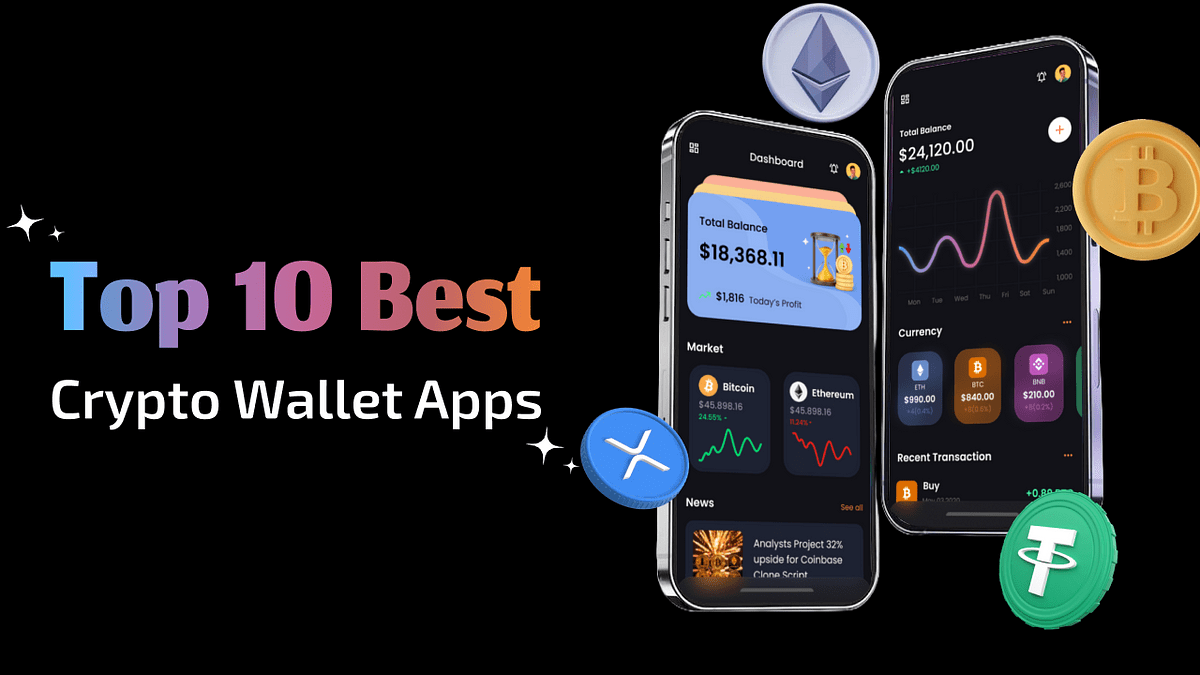
Conclusion: Finding the Best Blockchain Wallet app for Your Needs in 2024
Choosing the right crypto storage in 2024 comes down to your specific needs and priorities—whether it's security, accessibility, or support for diverse assets. For beginners seeking simplicity, hot wallets like Coinbase Wallet and ZenGo offer intuitive interfaces and unique security features. On the other hand, experienced investors prioritizing security might prefer cold wallets like Ledger Nano X or Trezor Model T for long-term storage.
If you’re actively trading or using DeFi applications, a hot wallet such as MetaMask or Trust Wallet would be ideal for quick access and dApp compatibility. Meanwhile, users with diversified portfolios should consider multi-currency wallets like Guarda Wallet or Exodus, which support a broad range of assets.
Ultimately, the best wallet is the one that aligns with your investment strategy and comfort level. Consider pairing a hot wallet for daily transactions with a cold wallet for storing larger sums, ensuring both security and convenience as you navigate the evolving crypto landscape in 2024.
FAQs: Common Questions About Best Digital Asset Wallet Apps Answered
What is a digital asset wallet?
A digital asset wallet is a digital tool that stores the private and public keys needed to access, send, and receive cryptocurrencies. While it doesn’t physically hold your crypto, it allows you to interact with the blockchain to manage your assets securely.
What’s the difference between a hot wallet and a cold wallet?
- Hot Wallets: Connected to the internet, making them convenient for trading and quick transactions. Examples include MetaMask and Trust Wallet.
- Cold Wallets: Offline devices like Ledger or Trezor designed for long-term storage, providing enhanced security against hacking.
How do I choose between a hardware and a software wallet?
Choose a hardware wallet if security is your main concern, especially for long-term storage. They are offline and safe from online attacks. Opt for a software (hot) wallet if you need frequent access to your funds for trading or DeFi activities. Many users use a combination of both for enhanced security and convenience.
Are Blockchain Wallets safe?
digital asset wallets can be safe if used correctly. Hot wallets are more vulnerable to cyberattacks due to their online nature, while cold wallets offer greater security but need to be physically safeguarded. Always use a reputable wallet provider and consider two-factor authentication (2FA) for added protection.
Which wallet is best for beginners?
For beginners, wallets like Coinbase Wallet and ZenGo are highly recommended due to their simple interfaces, strong security features, and easy setup. These wallets are designed to make managing crypto straightforward, with helpful guides and 24/7 support available.
Can I use multiple wallets at once?
Yes, many users opt for a combination of wallets to balance security and convenience. A common setup is using a hot wallet for daily trading and a cold wallet for storing large amounts. This strategy is often recommended for both beginners and advanced users.
What should I do if I lose access to my wallet?
Recovery depends on the type of wallet. For non-custodial wallets like ZenGo, innovative recovery models using facial recognition can help restore access without a traditional seed phrase. In most cases, having a secure backup of your seed phrase is essential to regain control of your wallet.
Do I need a wallet to buy crypto?
No, you don’t necessarily need a separate wallet if you’re purchasing crypto on an exchange like Coinbase or Binance, as they provide integrated wallets. However, for full control of your funds, transferring them to a personal wallet (either hot or cold) is recommended.
What’s the difference between a custodial and non-custodial wallet?
- Custodial Wallets: The service provider (e.g., an exchange) controls your private keys. You rely on them for security, similar to a traditional bank.
- Non-Custodial Wallets: You have full control of your keys and funds. Examples include Trust Wallet, Ledger, and Trezor. Non-custodial wallets provide more security but require careful management of your private keys.














Discussion